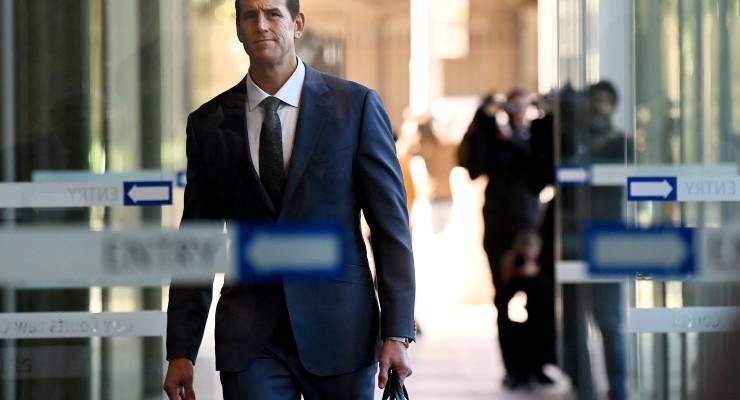
Former soldier Ben Roberts-Smith is being taken through the circumstances of his marriage breakdown in the Federal Court this morning, through the notes taken by a doctor and a marriage guidance counsellor as well as text messages.
The Victoria Cross winner told the court that he was technically separated from wife Emma Roberts, even though he stayed overnight (in a separate room) at his marital home two or three nights a week, spent Christmas and New Year together, and even went on a family holiday to Singapore.
Asked if he had had sex with his wife during that time, he said: “I don’t recall.”
Roberts-Smith agreed that he had been having an affair with a woman who has asked not to be identified, but is called Person 17 during this trial. The relationship started in October 2017 and ended in about April.
Under questioning from Nicholas Owens, SC, Roberts-Smith denied hitting Person 17 on the face after a dinner at Parliament House in March 2017.
“I have never hit a woman, I would never hit a woman and I certainly did not hit Person 17.”
Roberts-Smith rejected as “disgusting” a suggestion from Owens that he photographed Person 17’s naked body in order to blackmail her.
He also denied that a text message he sent the woman saying “don’t fucking abuse me again because it won’t end well” was threatening, saying that the newspapers’ legal team had combed through hundreds of text messages and chosen that one “selectively”.
Asked about this relationship, the former soldier said: “I didn’t know what I wanted — my wife wanted to keep trying. I didn’t want to throw it away completely and I met someone else at a time when I didn’t know what I wanted. I was separated but I didn’t want to tell her I was seeing someone because I didn’t want to hurt her feelings.”
He said that he and Person 17 saw each other as he travelled around the country, and stayed in hotels together. He said he wanted to keep the relationship a secret because he was concerned with his wife’s feelings.
He also said he had dinner with his wife at the Spirit House restaurant at Yandina for their wedding anniversary during this time, when she had given him some cufflinks.
The court heard that a text message exchange with Person 17 involved her asking him if he had “slept with [his] wife that week”, to which he’d replied that he had.
Roberts-Smith denied that he had made up a lie about the separation to avoid embarrassment and the public fallout from the news of the affair, which had appeared in the media.
He also denied telling his wife that she would lose the children if she did not adhere to the story that the two of them had been separated at the time of the affair, and that she also needed to adhere to this story when giving evidence in these court proceedings.
Additionally, the former soldier denied Person 17’s assertions that he had promised to buy her a pink Argyle diamond engagement ring.
Nine’s barrister, Owens, asked Roberts-Smith if he had indeed bought a pink Argyle diamond ring but subsequently given it to his wife. He denied doing so.
Roberts-Smith is suing three newspapers — The Sydney Morning Herald, The Age and The Canberra Times — and three journalists for defamation over a series of stories that suggested he was involved in war crimes while deployed with special forces in Afghanistan. He is also accused of hitting Person 17 in the face during an argument in a hotel in Canberra.
Roberts-Smith denies all allegations. The organisations are chiefly relying on a truth defence.
In other news, the new COVID-related travel restrictions have threatened to derail the case, with many witnesses unable to travel to Sydney to give evidence.
Lawyers in the multimillion-dollar trial, with a bar table crammed with the country’s most expensive senior counsel, are now scrambling to reorganise the witness lists as state borders slam shut around the country.
None of the witnesses scheduled to appear next week can attend because they are scheduled to come from WA, which now has a “hard border” with NSW, meaning that no one can move between the states without doing two weeks’ quarantine in the western state.
Although many legal cases have gone online over the past year, this case cannot be conducted remotely due to security concerns.
Owens told Justice Anthony Besanko this morning that “the border restrictions have led to chaos”.
The issue is that even if the WA witnesses are granted an exemption to travel to NSW to give evidence, not all of their legal representatives are prepared to suffer the consequences, which is two weeks of quarantine on their return home.
Owens flagged the possibility that he would have to reorganise the order of witnesses to accommodate this new reality, saying that there are “complex and difficult considerations” and “it would not be the way that I would be prepared to run the case”.
“I did not want to lead the case this way… if I have to I will,” he added.
The other complication is that there are many Afghan-based witnesses on the list, who have to give evidence from Kandahar. There have been problems getting translators of sufficient proficiency in the relevant language, which is Pashto.
The hearing continues.








Crikey encourages robust conversations on our website. However, we’re a small team, so sometimes we have to reluctantly turn comments off due to legal risk. Thanks for your understanding and in the meantime, have a read of our moderation guidelines.